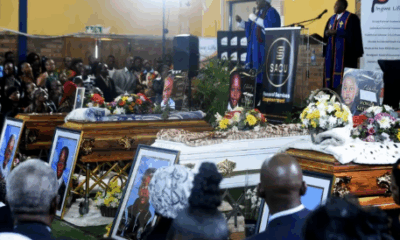News
‘A Catastrophic Mistake’: How the Disbanding of Cato Manor’s Elite Crime Unit Sparked a Surge in Violence

‘A Catastrophic Mistake’: How the Disbanding of Cato Manor’s Elite Crime Unit Sparked a Surge in Violence
When KwaZulu-Natal’s once-feared Cato Manor Organised Crime Unit was disbanded in 2012, the ripple effects were immediate and devastating. What was once a highly skilled, tightly coordinated team taking down cash-in-transit syndicates and hitmen has become, more than a decade later, a cautionary tale about politics, power, and the slow unravelling of law enforcement in South Africa.
This week, former commander Major General Johan Booysen broke his silence, calling the decision to close the unit a “catastrophic mistake” that crippled the police’s ability to fight organised crime in the province.
A Decade Later, Regret Echoes in Parliament
Booysen’s comments come on the heels of former police minister Bheki Cele’s explosive testimony before Parliament’s Ad Hoc Committee investigating alleged collusion between politicians, senior police officers, and criminals. Cele, never one to mince words, told MPs that shutting down the Cato Manor team had “undermined the fight against crime” in KwaZulu-Natal.
“Cash-in-transit heists were zero because of that unit,” Cele said, adding that since its closure, violent crime had “gone up like a Concorde.”
It was a startling admission from a man who once led the South African Police Service (SAPS).
The Unit That Kept Criminals Awake at Night
At its peak, the Cato Manor unit was a powerhouse. Under Booysen’s leadership, they tracked syndicates, dismantled ATM bombing networks, and brought down taxi hitmen. Their results were so effective that even criminals reportedly avoided operating in certain parts of the province.
But the unit’s downfall came swiftly. In 2012, it was accused of being a “death squad”, a label amplified by a controversial newspaper exposé. Those claims, later retracted, sparked outrage, political meddling, and internal power plays, ultimately leading to the unit’s disbandment.
According to Booysen, the smear campaign was “planted by nefarious players within Crime Intelligence”, and the decision to shut the unit down was politically motivated.
“Before they were unceremoniously closed, they had brought down heists and ATM bombings to almost zero. Their work saved lives,” Booysen said. “After their closure, crime spiked. Years of institutional knowledge and informer networks were destroyed overnight.”
‘A Disaster for Law Enforcement’
For Booysen, the consequences were more than just a rise in crime stats, they signalled a collapse of confidence within SAPS. He pointed to what he called a series of “disastrous appointments” at the top, including former national commissioner Riah Phiyega and later Berning Ntlemeza, both of whom faced controversies during their tenures.
“The police are in an existential crisis,” Booysen warned. “We need decisive leadership, no more experiments. The organisation is teetering on the edge.”
A Legacy of Distrust
Following the arrests of Cato Manor members, several officers launched multi-million-rand lawsuits against the state, claiming reputational and emotional damage from the false allegations.
While some legal battles are still ongoing, the public’s trust in the police has eroded. Violent crime in KwaZulu-Natal, from taxi killings to armed robberies continues to spiral, echoing the void left by the Cato Manor team.
Politics and Policing: A Dangerous Mix
Cele has been outspoken about what he calls a “habit of reversing progress” during the Zuma era, hinting that the decision to shut down the unit was influenced by political interference rather than evidence.
When asked directly why the unit was closed, Cele shot back:
“Ask KwaZulu-Natal Commissioner Nhlanhla Mkhwanazi he’s still there. The late minister Nathi Mthethwa and the president at the time had a habit of reversing things.”
It’s a statement that reflects a long-running tension in South African policing between political oversight and operational independence.
The Numbers Don’t Lie
In the years after Cato Manor’s disbandment, cash-in-transit heists, vehicle hijackings, and murders surged across KwaZulu-Natal. Community leaders in Durban and surrounding areas have repeatedly called for specialised units to return, arguing that local police stations lack both resources and experience to handle organised syndicates.
A former resident of Cato Manor told The Mercury:
“When that unit was here, we slept better. Now, you hear gunshots at night, and no one even bothers to call the police anymore.”
For Booysen, the lesson is clear, policing without autonomy, integrity, and political backing is doomed to fail.
“The Cato Manor unit worked because it was built on trust and intelligence,” he said. “Once politics stepped in, that disappeared.”
As the Ad Hoc Committee continues its investigation into corruption and collusion within law enforcement, one truth is becoming undeniable: South Africa’s crime crisis isn’t just about criminals, it’s about the systems that allowed them to thrive.
And if Booysen and Cele are right, the disbanding of Cato Manor wasn’t just a mistake, it was the moment the war on violent crime began to unravel.
{Source: IOL}
Follow Joburg ETC on Facebook, Twitter , TikTok and Instagram
For more News in Johannesburg, visit joburgetc.com


























